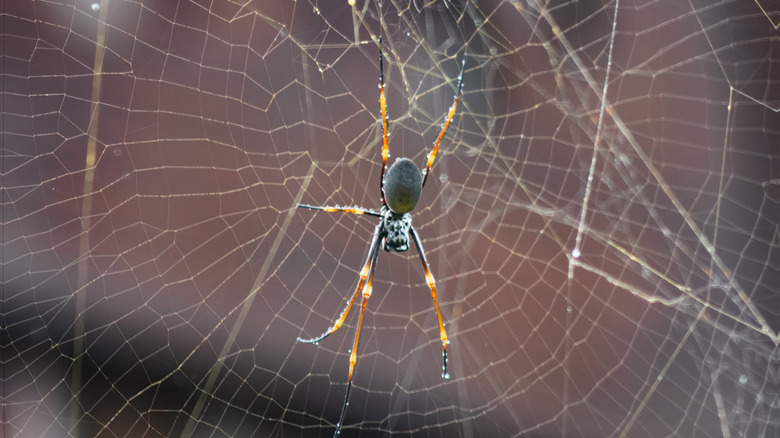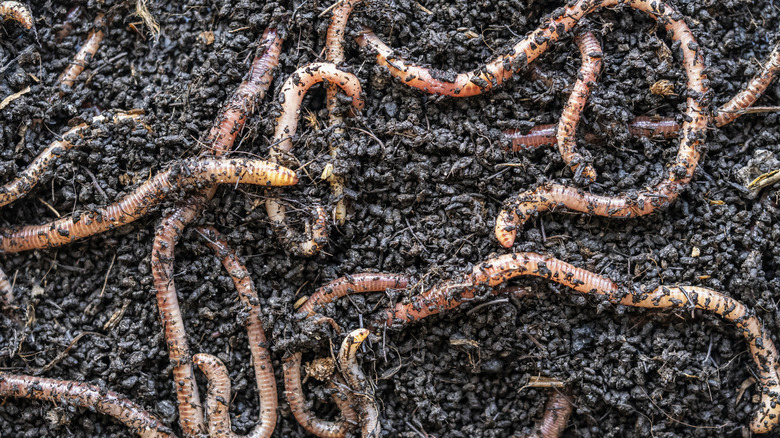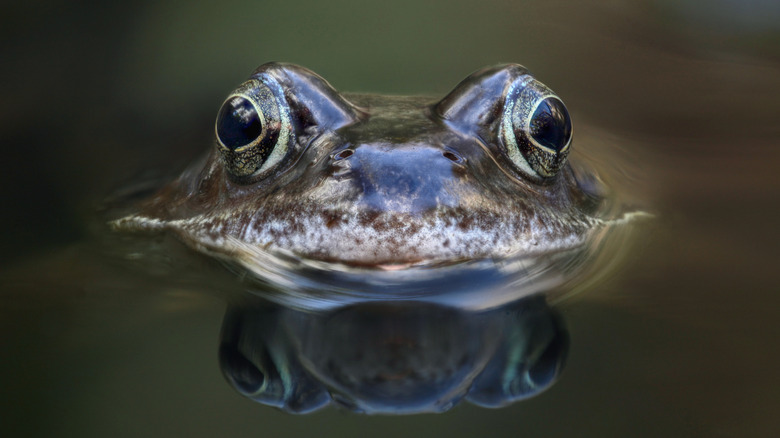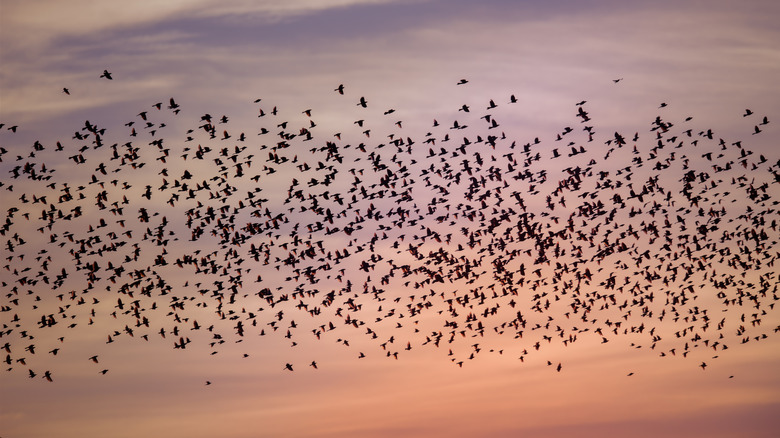10 Scary And Unusual Things That Have Fallen From The Sky
The sky is a vast, empty place. Nothing up there but birds, planes, clouds — and some low-flying satellites. Virtually everything that goes up there must eventually come down since birds need to eat and planes have to refuel. Most of these flying objects descend from the sky in a controlled, expected manner, but sometimes reality throws a curveball with the intent to scare the bejeezus out of witnesses.
Every so often, something unexpected falls out of the sky. These things can range from surprise hailstorms to space junk, such as abandoned launch-stage debris. While we can expect certain items to fall out of the sky every so often due to ever-worsening weather patterns and space junk pollution, once in a blue moon something that seemingly defies all logic and laws of probability hurtles towards the ground. Occasionally, these rogue freefallers aren't just unusual but actually downright terrifying due to their nature or implications. Even when the explanation is mundane, it does little to assuage the scare of what fell out of the sky and why.
Here are some of the scariest and most unusual items to fall from the sky.
Fish
You've probably heard about the phrase "it's raining cats and dogs." The sentence doesn't literally mean cats and dogs are falling out of the sky, just that it's raining heavily. However, animals can fall from the sky due to certain weather patterns.
Fish are some of the more common creatures to rain down on land. Noteworthy fish-falls occurred in 2021 in Texarkana, Texas, and in 2017 in Tampico, Mexico. While nobody is sure precisely how these animals traveled so far inland, the most prevalent and probable explanations are that high winds and waterspouts plucked them out of the water and sent them to their final destinations. This might explain most recorded examples of piscine precipitation, but it doesn't explain all of them.
In June of 2015, Virginia Beach residents experienced a thunderstorm. It was a standard storm in every sense save one. After the rain stopped, Virginia Beach resident Sue Bowser found a 13-inch dogfish shark in her backyard. Unlike the waterspouts and wind gusts, a lone shark dead on land 300 yards (900 feet) away from the ocean suggested a simple explanation: A large predatory bird snagged the fish for a meal but lost its grip as it flew over the house.
Money
You can't get anything for free, and cash won't fall out of the sky onto your lap. Unless it actually does. On rare occasions, money has literally rained down, albeit for the most mundane reasons. For instance, in 2018, gold bars showered the ground of Siberia. However, this was no gift from the heavens. According to reports, a cargo plane had taken off from Yakutsk airport in Siberia carrying approximately nine tons of gold. During takeoff the cargo hatch was partially ripped open due to a strong flow of air, and since technicians didn't properly tie the gold down, an unknown number of bars littered the ground up to 26 kilometers (16.2 miles) away from the airport. Authorities were able to recover 172 of the gold bars — approximately 3.75 tons — but it is unknown if that accounted for all the missing gold.
While that explanation of raining money was fairly mundane, others might be considered a miracle. In 1940, the residents of Drosmieshchora, Russia, witnessed an astonishing event: Antique coins from the 16th century tumbled to the ground in their secluded village. Apparently, this treasure was hidden beneath nearby soil, and the combination of geological changes and a tornado kicked up the ancient money as a literal whirlwind of fate that changed the course of history for the village.
Spiders
Spiders are more varied than you'd think. They all have eight legs, and most can produce silk. However, not all spiders hunt by spinning webs and waiting for prey to wander into them; some launch webs at targets like Spider-Man. Heck, some spiders use their silk in novel and terrifying ways that can instill arachnophobia into even the bravest of souls.
If you ever wondered how spiders escape natural disasters, the answer is "ballooning." These critters use their silk like sails to carry them wherever the wind, or electrical fields, takes them. In 2021, spiders fled Gippsland, Australia en masse due to heavy wind and rain – don't worry, the human residents fled as well. Due to how much silk the spiders spun, when people finally returned, the town was so covered you'd think Shelob from "The Lord of the Rings" lived there. Although the incident was a surprise to the town, it's quite a common phenomenon after floods.
You're probably wondering what's worse than spiders covering a town in gossamer after rare severe weather. The answer is when spiders cover a town on an annual basis. Every year, from December to March, hundreds of spiders throughout rural towns in Brazil weave communal webs so colossal they can remain stable even above the trees. All the while, spiders hang down from them in a spectacle that looks like it belongs in a horror movie. This behavior isn't dangerous to humans, but it's enough to make your skin crawl.
Blood(?)
Dangerous materials such as forever chemicals have found their way into water droplets, meaning that rainwater isn't as safe as we once thought. However, for some people, rainwater was already a little problematic.
In 2014, residents of the Zamora province of Spain witnessed a weather pattern seemingly ripped from the Book of Exodus. Villagers reported that blood rained down from the sky; rivers ran red and fountains were stained crimson, as if a sign of the end times. Also, India's Malabar Coast has experienced red rain multiple times throughout the last century — but neither were even blood to begin with.
Turns out "blood" rained down not because God was angry but because the red droplets were just regular water colored by microorganisms. The red rain in Spain was the result of an algae known as Haematococcus pluvialis, which turns red when stressed, whereas India's crimson precipitation was the result of a lichen called Trentepohlia, which is naturally red. Both were swept up into the air and colored the rain as it came down. While that makes sense, you can't blame the people who saw the events firsthand for assuming blood was pouring from the sky. Who would ever use "algae-infused, cloud-brewed tea" as a first explanation?
Worms
Just because rainwater looks like blood, doesn't mean it is blood. However, although some reports of items falling from the sky are a case of mistaken identity, other times they're the real deal.
Worms (as in earthworms) have occasionally fallen from the sky. Two noteworthy cases include Norway in 2015, and Jennings, Louisiana in 2007. During the Norwegian incident, the worms fell in globs of up to 20 worms per square meter, onto fresh snow after allegedly being taken up into the air by warm thermals. Meanwhile, the worms in Louisiana dropped after being blasted up into the sky due to a waterspout. Few feelings are worse than having a creepy crawly plop onto your head, before realizing they're still falling.
While there is precedent for worms raining down during unusual weather patterns, Occam's razor dictates that if you see worms falling from the sky, it's not actually worms but merely something that looks like them. Case in point, in 2023, a video circulated that showed the aftermath of a worm shower in Liaoning Province, China. At a distance they certainly looked like worms, but in truth they were just catkins from poplar trees found throughout China. Still, the illusion was convincing, and it took someone brave enough to approach the freshly fallen flowers to determine they weren't actually worms.
Weird Greasy Liquid
Acid rain has been falling for several decades. True to its name, this unnatural form of precipitation is highly acidic and can damage structures. However, there are other materials known to fall from the sky that might not be as dangerous, but are definitely more disgusting.
In February of 2022, a mysterious liquid started raining from the sky over an east Las Vegas neighborhood and didn't stop for three weeks. It was dark, oily, and covered everything. Many residents were worried that the liquid was potentially harmful, so the local environmental authority collected samples for analysis. The good news was that the material was harmless; the bad news was that it was "bee frass," more commonly known as bee poop.
Nobody wants to touch poop regardless of what animal makes it, and to make matters worse, bee frass is difficult to wash off. So why did it cover the east Las Vegas neighborhood? According to the local beekeeper, it was the aftermath of bees waking up from their winter torpor and swarming new locations. If you ever encounter this liquid on your own, the beekeeper would like to remind you that bees are necessary for pollination, so don't hurt them, no matter how grossed out you are.
A Person
When most people board a plane, they stay on it until the vehicle lands. Sometimes, people jump out of a plane to skydive, but they almost always have the proper equipment, specifically a parachute. Most people who jump out of a plane without a functioning parachute don't survive. Most people.
Luke Aikins, an expert skydiver, once fell 25,000 feet without a parachute or wingsuit, and he broke his fall with a net. However, this death-defying stunt was scripted and doesn't even take the record for the highest parachuteless fall.
On January 26, 1972, a bomb went off in a Yugoslav Airlines flight when it was over mountains in Czechoslovakia. The plane was carrying 28 passengers and crew, 27 of whom died. The lone survivor was Vesna Vulovic, an air stewardess. She survived an estimated 33,000-foot freefall without any protective equipment. Experts believe Vulovic lived because a food cart trapped her in the plane's tail section before it landed in soft snow. Then, a nearby woodsman heard Vulovic stuck in the debris and screaming for her life, after falling from the sky.
Frogs
Some historians spend their lives studying the stories of religious texts, parsing where creative liberties end and reality begins. The Hebrew exodus from Egypt is at least partially based in truth, as there is precedence for frogs falling from the sky.
There are innumerable instances of falling frogs (and toads) throughout recorded history. The first written example took place in the first century C.E. in Rome, while the amphibious weather phenomenon also reportedly occurred in 1873 in Kansas City, 1947 in Marksville, Louisiana, and in 2005 in Odzaci, Serbia.
For the most part, frogs and toads have rained down on land due to the same weather patterns that create fish rain. Waterspouts and high-wind tornados are the most likely culprits, but every now and then a flash flood of frogs becomes even freakier than it already is. On June 16, 1882, frogs fell onto Dubuque, Iowa, but unlike other instances, these frogs were frozen and impacted the ground as four-legged balls of hail.
Meteorites
Thousands of meteorites hit the Earth every year, with the majority made out of common materials such as iron and nickel. Many sci-fi stories mention meteorites that carry elements you can't find on Earth. While this has yet to happen in reality, meteorites have crashed into our planet with the next best thing — the building blocks of life. In 1969, a meteorite made up of 8% water fell to Murchison, Australia, and became the subject of scientific fascination because of how fresh it was when found. In 2017, a team of scientists published a paper stating that they had found a new family of amino acids within the same meteorite.
While the Murchison meteorite gives scientists hope that life is out there somewhere, other meteorites have been more threatening. On June 26, 2025, a meteorite older than the Earth entered the atmosphere and burst into countless pieces over the state of Georgia, piercing through houses in areas such as McDonough and Henry County. While this only damaged residences, in 1954, Ann Hodges was asleep in her home in Alabama when a meteor crashed through her roof. Unlike the meteor over Georgia, this one hit Hodges and left her with a large bruise on her hip.
Birds
Up until the 1980s, coal miners always worked with a canary by their side. The bird's constant singing lightened spirits while miners dug, and if the bird stopped singing, it was a sign to get out of there because carbon monoxide gas had killed it. Turns out birds suddenly dying can be a warning sign, especially if they're in the air.
In 2022, security cameras captured a horrifying scene: An entire flock of yellow-headed blackbirds fell to the ground in Chihuahua, Mexico. While some recovered, many died. According to a local veterinarian, the birds most likely ran into power lines or breathed in toxic fumes from a nearby heater. Similarly, in 2021, hundreds of sparrows dropped dead over a graveyard in Gianyar, Bali. Initially, local authorities claimed the birds died due to exposure from acid rain, but upon closer examination, it was found that the sparrows were killed by ingesting grains sprayed with pesticides.
Not all birds drop dead mid-flight due to poisoning; sometimes they die in a freak accident. In 2018, over 50 geese suddenly plummeted onto a parking lot in Idaho Falls, Idaho. Unlike the other events, there were no survivors, and many of the bird's stomachs had exploded. The most probable cause? Lightning. Birds aren't the only casualties of nasty weather patterns. The same year, hundreds of dead flying fox bats littered the ground in New South Wales, Australia. According to local authorities, the bats were the victims of a heat wave, with their brains literally boiling from the conditions.










